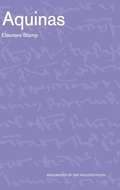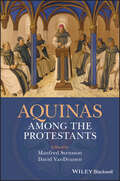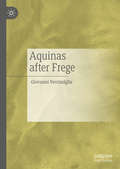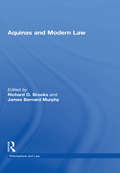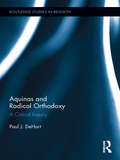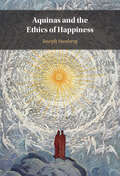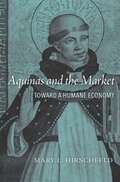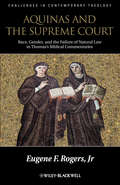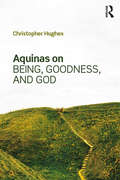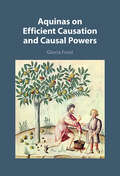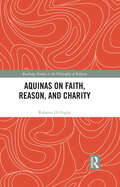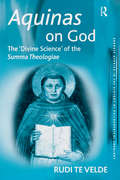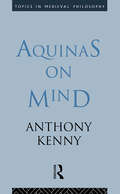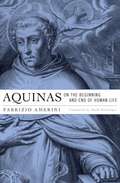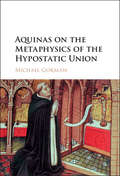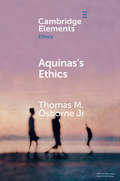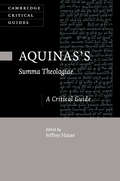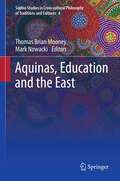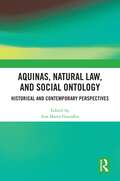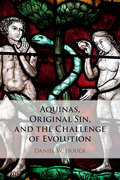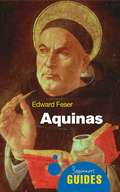- Table View
- List View
Aquila in the New World (The Aquiliad, Volume I)
by Somtow Sucharitkul S. P. SomtowCould a Roman general survive an untamed America? Perhaps, with the aid of the wily Indian Aquila.
Aquinas
by Eleonore StumpFew philosophers or theologians exerted as much influence on the shape of medieval thought as Thomas Aquinas. He ranks amongst the most famous of the Western philosophers and was responsible for almost single-handedly bringing the philosophy of Aristotle into harmony with Christianity. He was also one of the first philosophers to argue that philosophy and theology could support each other. The shape of metaphysics, theology, and Aristotelian thought today still bears the imprint of Aquinas' work. <p><p> In this extensive and deeply researched study, Eleonore Stump examines Aquinas' major works, Summa Theologiae and Summa Contra Gentiles, and clearly assesses the vast range of Aquinas' thought. Philosophers, theologians, and students of the medieval period alike will find this unrivalled study an indispensable resource in researching and teaching Aquinas.
Aquinas Among the Protestants
by David VanDrunen Manfred SvenssonThe Protestant philosophical and theological heritage of Thomas Aquinas This major new book provides an introduction to Thomas Aquinas’s influence on Protestantism. The editors, both noted commentators on Aquinas, bring together a group of influential scholars to demonstrate the ways that Anglican, Lutheran, and Reformed thinkers have analyzed and used Thomas through the centuries. Later chapters also explore how today’s Protestants might appropriate the work of Aquinas to address a number of contemporary theological and philosophical issues. The authors set the record straight and disavow the widespread impression that Aquinas is an irrelevant figure for the history of Protestant thought. This assumption has dominated not only Protestant historiography but also Roman Catholic accounts of the Reformation and Protestant intellectual life. The book opens the possibility for contemporary reception, engagement, and critique and even intra-Protestant relations and includes: Information on the fruitful appropriation of Aquinas in Anglican, Lutheran, and Reformed theologians over the centuries Important essays from leading scholars on the teachings of Aquinas New perspectives on Thomas Aquinas’s position as a towering figure in the history of Christian thought Aquinas Among the Protestant is a ground-breaking and interdenominational work for students and scholars of Thomas Aquinas and theology more generally.
Aquinas after Frege
by Giovanni VentimigliaThis book provides a fresh reading of Aquinas’ metaphysics in the light of insights from the works of Frege. In particular, Ventimiglia argues that Aquinas’ doctrine of being can be better understood through Frege’s distinction between the ‘there is’ sense and the ‘present actuality’ sense of being, as interpreted by Peter Geach and Anthony Kenny. Aquinas’ notion of essence becomes clearer in the light of Frege’s distinction between objects and concepts and his account of concepts as functions. Aquinas’ doctrine of trancendentals is clarified with the help of Frege’s accounts of assertion and negation. Aquinas after Frege provides us with a new Aquinas, which pays attention to his texts and their historical context. Ventimiglia’s development of ‘British Thomism’ furnishes us with a lucid and exciting re-reading of Aquinas’ metaphysics.
Aquinas and Modern Law (Philosophers And Law Ser.)
by JamesBernard MurphyThis volume collects some of the best recent writings on St. Thomas‘s philosophy of law and includes a critical examination of Aquinas‘s theory of the relation between law and morality, his natural law theory, as well as the modern reformulation of his approach to natural rights. The volume shows how Aquinas understood the importance of positive law and demonstrates the modern relevance of his writings by including Thomistic critiques of modern jurisprudence and examples of applications of Thomistic jurisprudence to specific modern legal problems such as federalism, environmental policy, abortion and euthanasia. The volume also features an introduction which places Aquinas‘s writings in the context of modern jurisprudence as well as an extensive bibliography. The volume is suited to the needs of jurisprudence scholars, teachers and students and is an essential resource for all law libraries.
Aquinas and Radical Orthodoxy: A Critical Inquiry (Routledge Studies in Religion)
by Paul DeHartAquinas and Radical Orthodoxy investigates the encounter of the most vibrant and controversial trend in recent theology with the greatest Christian thinker of the Middle Ages. The book describes Radical Orthodoxy’s orientation and highlights those anti-secular strategies and intellectual influences that have shaped its appeal to Aquinas. It surveys the emergence of the particular picture of Aquinas especially associated with the leaders of Radical Orthodoxy, John Milbank and his student Catherine Pickstock, along with the scholarly disputes which prompted and followed that development. The book then undertakes a detailed investigation of the pivotal publications on Aquinas of those two authors, laying out their difficult theories in clear language, carefully examining the texts of Aquinas to which they appeal, and challenging their interpretations on a number of fundamental points. Topics covered include: analogical language and knowledge of God, the role of metaphysics within theology, the relation of cognition to the divine archetypes of things, the possibility of human apprehension of God’s essence, the nature of substance, and speculation on the Trinity. The conclusion reflects on those elements suppressed by the Radical Orthodox reading of Aquinas, their constructive philosophical and theological possibilities, and the challenges they present to the Radical Orthodox project.
Aquinas and the Ethics of Happiness
by Joseph StenbergAquinas sees the key elements of his ethics – happiness, law, virtue, and grace – as an interconnected whole. However, he seldom steps back to help his reader see how they actually fit together. In this book, Joseph Stenberg reconsiders the most fundamental ways in which Aquinas connects these major elements of his ethics. Stenberg presents a novel reading of Aquinas's account of individual happiness that is historically sound and philosophically interesting, according to which happiness is exclusively a matter of engaging in and enjoying genuinely good activities. He builds on that reading to offer an account of common happiness. He then shows that Aquinas defends a unique form of eudaimonism, Holistic Eudaimonism, which puts common happiness rather than individual happiness at the very heart of ethics, including at the heart of law, virtue, and grace. His book will appeal to anyone with an interest in Aquinas or the history of ethics.
Aquinas and the Market: Toward a Humane Economy
by Mary L. HirschfeldEconomists investigate the workings of markets and tend to set ethical questions aside. Theologians often dismiss economics, losing insights into the influence of market incentives on individual behavior. Mary L. Hirschfeld bridges this gap by showing how a humane economy can lead to the good life as outlined in the thought of St. Thomas Aquinas.
Aquinas and the Nicomachean Ethics
by Matthias Perkams Tobias Hoffmann Jörn MüllerAristotle's Nicomachean Ethics is the text which had the single greatest influence on Aquinas's ethical writings, and the historical and philosophical value of Aquinas's appropriation of this text provokes lively debate. In this volume of new essays, thirteen distinguished scholars explore how Aquinas receives, expands on, and transforms Aristotle's insights about the attainability of happiness, the scope of moral virtue, the foundation of morality, and the nature of pleasure. They examine Aquinas's commentary on the Ethics and his theological writings, above all the Summa theologiae. Their essays show Aquinas to be a highly perceptive interpreter, but one who also who also brings certain presuppositions to the Ethics and alters key Aristotelian notions for his own purposes. The result is a rich and nuanced picture of Aquinas's relation to Aristotle that will be of interest to readers in moral philosophy, Aquinas studies, the history of theology, and the history of philosophy.
Aquinas and the Supreme Court: Race, Gender, and the Failure of Natural Law in Thomas's Bibical Commentaries (Challenges in Contemporary Theology)
by Eugene F. Rogers Jr.This new work clarifies Aquinas’ concept of natural law through his biblical commentaries, and explores its applications to U.S. constitutional law. The first time the use of Aquinas on the U.S. Supreme Court has been explored in depth, and its applications tested through a rigorous reading of the biblical commentaries Shows how key judgments in the Supreme Court have rested on medieval natural law, and applies critical gender theory to discuss problems with these applications Offers new research data to give a different picture of Aquinas and natural law, and a fresh take on Aquinas’ biblical commentaries New research based on passages in the biblical commentaries never before available in English
Aquinas on Being, Goodness, and God
by Christopher HughesThomas Aquinas is one of the most important figures in the history of philosophy and philosophical theology. Relying on a deep understanding of Aristotle, Aquinas developed a metaphysical framework that is comprehensive, detailed, and flexible. Within that framework, he formulated a range of strikingly original and carefully explicated views in areas including natural theology, philosophy of mind, philosophical psychology, and ethics. In this book, Christopher Hughes focuses on Aquinas’s thought from an analytic philosophical perspective. After an overview of Aquinas’s life and works, Hughes discusses Aquinas’s metaphysics, including his conception of substance, matter, and form, and his account of essence and existence; and his theory of the nature of human beings, including his critique of a substance dualism that Aquinas attributes to Plato, but is usually associated with Descartes. In the final chapters, Hughes discusses Aquinas’s account of the existence and nature of God, and his treatment of the problem of evil, as well as his ideas about the relation of goodness to being, choice, and happiness. Aquinas on Being, Goodness, and God is essential reading for students and scholars of Aquinas, and anyone interested in philosophy of religion or the history of medieval philosophy.
Aquinas on Efficient Causation and Causal Powers
by Gloria FrostIn this innovative book, Gloria Frost reconstructs and analyses Aquinas's theories on efficient causation and causal powers, focusing specifically on natural causal powers and efficient causation in nature. Frost presents each element of Aquinas's theories one by one, comparing them with other theories, as well as examining the philosophical and interpretive ambiguities in Aquinas's thought and proposing fresh solutions to conceptual difficulties. Her discussion includes explanations of Aquinas's technical scholastic terminology in jargon-free prose, as well as background on medieval scientific views - including ordinary language explanations of the medieval physical theories which Aquinas assumed in formulating his views on causation and causal powers. The resulting volume is a rich exploration of a central philosophical topic in medieval philosophy and beyond, and will be valuable especially for scholars and advanced students working on Aquinas and on medieval natural philosophy.
Aquinas on Faith, Reason, and Charity (Routledge Studies in the Philosophy of Religion)
by Roberto Di CeglieThis book offers a new reading of Aquinas’ views on faith. The author argues that the theological nature of faith is crucial to Aquinas’ thought, and that it gives rise to a peculiar and otherwise incomprehensible relationship with reason. The first part of the book examines various modern and contemporary accounts of the relationship between faith and reason in Aquinas’ thought. The author shows that these accounts are unconvincing because they exhibit what he calls a Lockean view of faith and reason, which maintains that the relationship in question should only be treated by way of evidence. In other words, this view ignores the specific nature of the Christian faith and the equally specific way it needs to relate to reason. The second part offers a comprehensive account of Aquinas’ view of faith. It focuses on the way the divine grace and charity shape the relationship between evidence and human will. The final part of the book ties these ideas together to show how Christian faith, with its specifically theological nature, is perfectly compatible with rational debates. It also argues that employing the specificity of faith may constitute the best way to promote autonomous and successful rational investigations. Aquinas on Faith, Reason, and Charity will be of interest to scholars and advanced students working on Aquinas, philosophy of religion, Christian theology, and medieval philosophy.
Aquinas on God: The 'Divine Science' of the Summa Theologiae (Ashgate Studies in the History of Philosophical Theology)
by Rudi Te VeldeAquinas on God presents an accessible exploration of Thomas Aquinas' conception of God. Focusing on the Summa theologiae - the work containing Aquinas' most systematic and complete exposition of the Christian doctrine of God - Rudi te Velde acquaints the reader with Aquinas' theological understanding of God and the metaphysical principles and propositions that underlie his project. Aquinas' conception of God is dealt with not as an isolated metaphysical doctrine, but from the perspective of his broad theological view which underlies the scheme of the Summa. Readers interested in Aquinas, historical theology, metaphysics and metaphysical discourse on God in the Christian tradition will find this new contribution to the studies of Aquinas invaluable.
Aquinas on Human Self-Knowledge
by Therese Scarpelli CorySelf-knowledge is commonly thought to have become a topic of serious philosophical inquiry during the early modern period. Already in the thirteenth century, however, the medieval thinker Thomas Aquinas developed a sophisticated theory of self-knowledge, which Therese Scarpelli Cory presents as a project of reconciling the conflicting phenomena of self-opacity and privileged self-access. Situating Aquinas's theory within the mid-thirteenth-century debate and his own maturing thought on human nature, Cory investigates the kinds of self-knowledge that Aquinas describes and the questions they raise. She shows that to a degree remarkable in a medieval thinker, self-knowledge turns out to be central to Aquinas's account of cognition and personhood, and that his theory provides tools for considering intentionality, reflexivity and selfhood. Her engaging account of this neglected aspect of medieval philosophy will interest readers studying Aquinas and the history of medieval philosophy more generally.
Aquinas on Mind (Topics in Medieval Philosophy)
by Anthony Kenny Sir Anthony KennyThis book shows how the mature writings of Thomas Aquinas though written in the thirteenth century have much to offer the human mind and the relationship between intellect and will, body and soul.
Aquinas on the Beginning and End of Human Life
by Fabrizio AmeriniIn contemporary discussions of abortion, both sides argue well-worn positions, particularly concerning the question, When does human life begin? Though often invoked by the Catholic Church for support, Thomas Aquinas in fact held that human life begins after conception, not at the moment of union. But his overall thinking on questions of how humans come into being, and cease to be, is more subtle than either side in this polarized debate imagines. Fabrizio Amerini--an internationally renowned scholar of medieval philosophy--does justice to Aquinas's views on these controversial issues. Some pro-life proponents hold that Aquinas's position is simply due to faulty biological knowledge, and if he knew what we know today about embryology, he would agree that human life begins at conception. Others argue that nothing Aquinas could learn from modern biology would have changed his mind. Amerini follows the twists and turns of Aquinas's thinking to reach a nuanced and detailed solution in the final chapters that will unsettle familiar assumptions and arguments. Systematically examining all the pertinent texts and placing each in historical context, Amerini provides an accurate reconstruction of Aquinas's account of the beginning and end of human life and assesses its bioethical implications for today. This major contribution is available to an English-speaking audience through translation by Mark Henninger, himself a noted scholar of medieval philosophy.
Aquinas on the Metaphysics of the Hypostatic Union
by Michael GormanThe hypostatic union of Christ, namely his being simultaneously human and divine, is one of the founding doctrines of Christian theology. In this book Michael Gorman presents the first full-length treatment of Aquinas's metaphysics of the hypostatic union. After setting out the historical and theological background, he examines Aquinas's metaphysical presuppositions, explains the basic elements of his account of the hypostatic union, and then enters into detailed discussions of four areas where it is more difficult to get a clear understanding of Aquinas's views, arguing that in some cases we must be content with speculative reconstructions that are true to the spirit of Aquinas's thought. His study pays close attention to the Latin texts and their chronology, and engages with a wide range of secondary literature. It will be of great interest to theologians as well as to scholars of metaphysics and medieval thought.
Aquinas's Ethics (Elements in Ethics)
by Thomas M. Osborne JrThis Element provides an account of Thomas Aquinas's moral philosophy that emphasizes the intrinsic connection between happiness and the human good, human virtue, and the precepts of practical reason. Human beings by nature have an end to which they are directed and concerning which they do not deliberate, namely happiness. Humans achieve this end by performing good human acts, which are produced by the intellect and the will, and perfected by the relevant virtues. These virtuous acts require that the agent grasps the relevant moral principles and uses them in particular cases.
Aquinas's Summa Theologiae: A Critical Guide (Cambridge Critical Guides)
by Jeffrey HauseAlone among Thomas Aquinas's works, the Summa Theologiae contains well-developed and integrated discussions of metaphysics, ethics, law, human action, and the divine nature. The essays in this volume, by scholars representing varied approaches to the study of Aquinas, offer thorough, cutting-edge expositions and analyses of these topics and show how they relate to Aquinas's larger system of thought. The volume also examines the reception of the Summa Theologiae from the thirteenth century to the present day, showing how scholars have understood and misunderstood this key text, and how, even after seven centuries of interpretation, we still have much to learn from it. Detailed and accessible, this book will be highly important for scholars and students of medieval philosophy and theology.
Aquinas, Bonaventure, and the Scholastic Culture of Medieval Paris: Preaching, Prologues, and Biblical Commentary
by Randall SmithIn this volume, Randall B. Smith provides a revisionist account of the scholastic culture that flourished in Paris during the High Middle Ages. Exploring the educational culture that informed the intellectual and mental habits of Thomas Aquinas and Bonaventure, he offers an in-depth study of the prologues and preaching skills of these two masters. Smith reveal the intricate interrelationships between the three duties of the master: lectio (reading), disputatio (debate), and praedicatio (preaching). He also analyzes each of Aquinas and Bonaventure's prologues from their student days to their final works, revealing both their artistry and their instructional character. Written in an engaging style, this book serves as an invaluable resource that will enable scholars and students to read thirteenth-century sermons, prologues, and biblical commentaries with greater understanding and ease.
Aquinas, Education and the East (Sophia Studies in Cross-cultural Philosophy of Traditions and Cultures #4)
by Mark Nowacki Thomas Brian MooneyA confluence of scholarly interest has resulted in a revival of Thomistic scholarship across the world. Several areas in the investigation of St. Thomas Aquinas, however, remain under-explored. This volume contributes to two of these neglected areas. First, the volume evaluates the contemporary relevance of St. Thomas's views for the philosophy and practice of education. The second area explored involves the intersections of the Angelic Doctor's thought and the numerous cultures and intellectual traditions of the East. Contributors to this section examine the reception, creative appropriation, and various points of convergence between St. Thomas and the East.
Aquinas, Natural Law, and Social Ontology: Historical and Contemporary Perspectives
by Ana Marta GonzálezThis volume explores the connections between Thomas Aquinas’ doctrine of natural law and contemporary social thought. It aims to make explicit the basic notions of Thomas Aquinas’ social ontology and to show how key concepts from sociology, economics, and political science relate to his ethics and social thought.Social ontology is a growing area of contemporary social theory. Scholars in this area reflect on the ontological status of society and the various realities that make up the social realm. However, Aquinas scholars rarely use the term social ontology, instead resorting to his natural law to examine social life. This volume argues that the social thought of Thomas Aquinas, including his natural law theory, implies a social ontology. Aquinas adopts a clear position on the ontological uniqueness of human beings, the intentional structure of human action, and the existence of informal social relations and institutional realities that shape human society. This volume shows how these views can be reconstructed into a coherent social ontology. Its chapters are divided into five thematic parts. Part 1 offers conceptual elements to bridge the gap between Aquinas and contemporary social theory. Part 2 considers the metaphysics and theology implicit in Aquinas’ social ontology. Part 3 focuses on the way this ontology is at work in his account of the common good and his approach to natural law. Part 4 expands this reflection to economics. Finally, Part 5 addresses legal and political issues such as political polarization, family law, and the ethics of war.Aquinas, Natural Law, and Social Ontology will appeal to scholars and graduate students interested in the thought of Thomas Aquinas, social and political philosophy, contemporary social theory, Catholic theology, and the social sciences.
Aquinas, Original Sin, and the Challenge of Evolution
by Daniel W. HouckIs original sin compatible with evolution? Many today believe the answer is 'No'. Engaging Aquinas's revolutionary account of the doctrine, Daniel W. Houck argues that there is not necessarily a conflict between this Christian teaching and mainstream biology. He draws on neglected texts outside the Summa Theologiae to show that Aquinas focused on humanity's loss of friendship with God - not the corruption of nature (or personal guilt). Aquinas's account is theologically attractive in its own right. Houck proposes, moreover, a new Thomist view of original sin that is consonant with evolution. This account is developed in dialogue with biblical scholarship on Jewish hamartiology and salient modern thinkers (including Kant, Schleiermacher, Barth, and Schoonenberg), and it is systematically connected to debates over nature, grace, the desire for God, and justification. In addition, the book canvasses a number of neglected premodern approaches to original sin, including those of Anselm, Abelard, and Lombard.
Aquinas: A Beginner's Guide (Beginner's Guides)
by Edward FeserOne of the most influential philosophers and theologians in history, St. Thomas Aquinas was the father of modern philosophy of religion, and is infamous for his "proofs" for God's existence. In this cogent introduction to the great Saint's work, Edward Feser argues that you cannot fully understand Aquinas' philosophy without his theology and vice versa. Covering his thoughts on the soul, natural law, metaphysics, and the interaction of faith and reason, this will prove indispensable for students, experts or the general reader.

